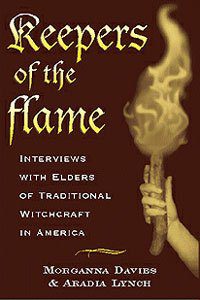 Keepers of the Flame is a collection of interviews with elders of Traditional Witchcraft in America. For the purposes of their book, authors Morganna Davies and Aradia Lynch agreed to define traditionalists as those people who are either hereditary, initiatory, or both. Covering more than ten traditions, the book includes Raymond Buckland, Hans Holzer, Judy Harrow, Chas Clifton, Leo Louis Martello, and many other figures that have been important in shaping American Witchcraft. However, this book isn’t about the elders or their traditions per se. It’s more of their accounts of what the Craft was like in its early days, at the time of writing, and what they think it will be like in the future.
Keepers of the Flame is a collection of interviews with elders of Traditional Witchcraft in America. For the purposes of their book, authors Morganna Davies and Aradia Lynch agreed to define traditionalists as those people who are either hereditary, initiatory, or both. Covering more than ten traditions, the book includes Raymond Buckland, Hans Holzer, Judy Harrow, Chas Clifton, Leo Louis Martello, and many other figures that have been important in shaping American Witchcraft. However, this book isn’t about the elders or their traditions per se. It’s more of their accounts of what the Craft was like in its early days, at the time of writing, and what they think it will be like in the future.
Keepers of the Flame is divided into two sections. Part one profiles the elders within their traditions. Among those included are the Gardnerian, Alexandrian, Georgian, Mohsian, and Strega traditions. Part two asks the elders their perspectives on a series of questions and issues such as ethics, degrees, hierarchy, secrecy, magick, and more.
My edition of Keepers of the Flame was published in 2001, but it reads like an older book. Opinions abound about the Craft being an exclusive and ancient religion that survived the Inquisition thanks to its secretive and oral nature. Many of the elders express the belief that being a Witch requires formal training in a hierarchical degree system that leads to initiation and elevations. Anything else simply isn’t Craft. There’s a resounding fear that comes through about being public, growing, and interacting with other Pagans. Some believe that traditional Craft has no place in the growing Pagan community, which they see largely as a temporary fad.
Only a few of these elders, namely Judy Harrow and Chas Clifton, seem more grounded in the realities of a community that can extend beyond a small coven. As an academic, Clifton expresses ambivalence towards the degree system, which he says can serve as recognition of dedication, achievements, and maturity, or as a weapon of snobbery and meaningless personal politics. Harrow discusses the necessities of developing theological and pastoral skills.
Although I find myself in disagreement with many the elders on most of the issues addressed, Keepers of the Flames has some value. It offers a glimpse into a small world of Traditional Witchcraft that most Pagans will never penetrate. This book isn’t a relic and there are still many Witches who believe this is the only true form of Witchcraft. It also has historical value. The Witches featured are important figures, have knowledge and wisdom to pass on, and deserve respect for their achievements and contributions. I also enjoyed reading about how people come to the Craft and what the community was like in its early days. Some of these elders have passed over and books like Keepers of the Flame contribute to our historical records.

I have read this and came to the same conclusions you did. I was glad I read it even though I disagree about exclusionism. There are many paths to knowledge.I had the honor of meeting Lady Sintana and spending a wonderful weekend with her. Amazing woman. Thanks for the reminder…Cynthia from Weaving the Web